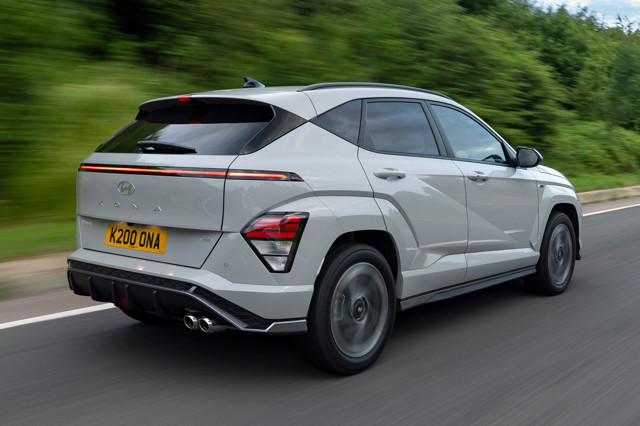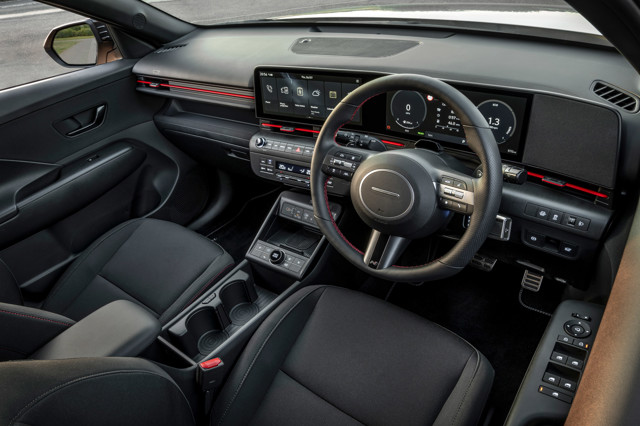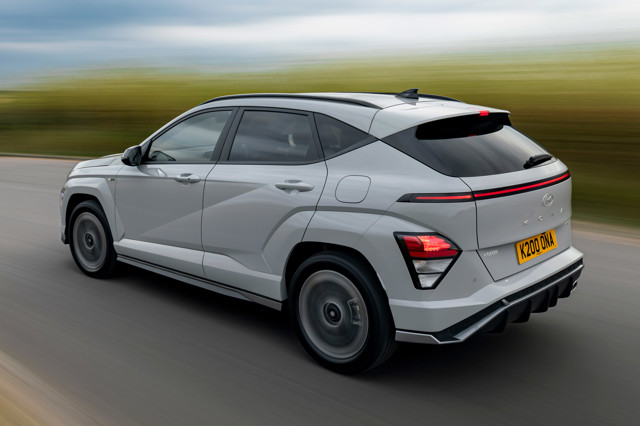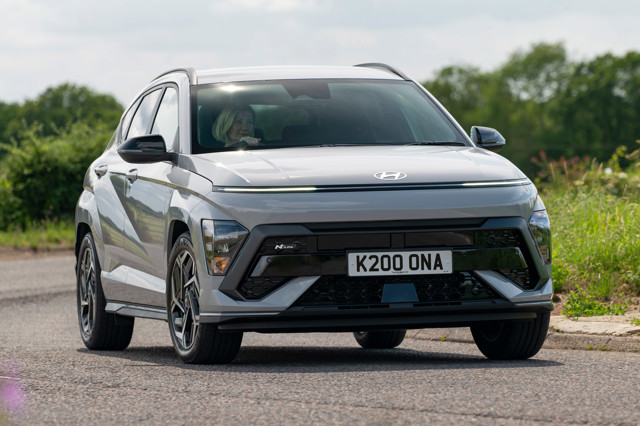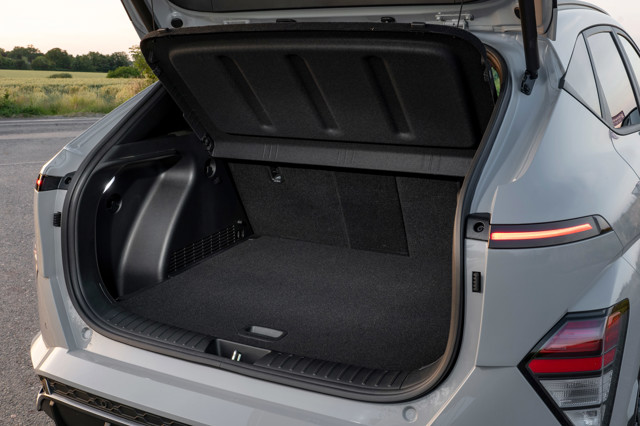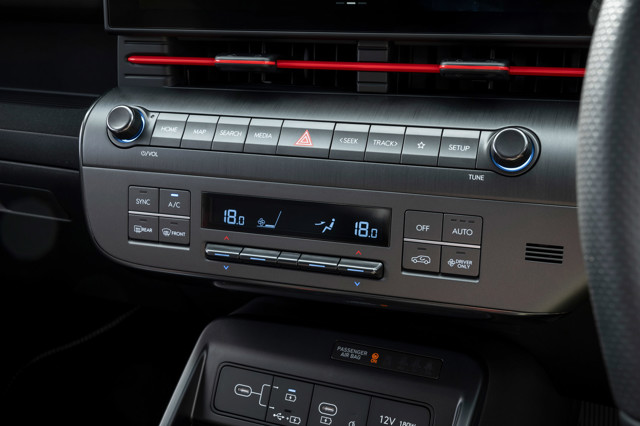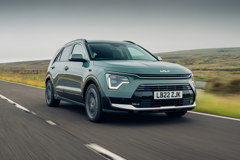Hyundai Kona Review 2024
Hyundai Kona At A Glance



Have you seen the advert? Hi-un-dye is now Hyun-day - a fairly insignificant shift, but one that represents a new era for the brand. Hyundai's no longer about budget cars. Instead, it's about innovation, electrification and bold design. That's reflected perfectly in the Hyundai Kona.
If you're looking for a no-nonsense small SUV that comes fully loaded with kit and will be cheap to run, the new Hyundai Kona is a perfectly decent new car. As we'll explain in our Hyundai Kona review.
While you can see a clear resemblance its predecessor, the new Hyundai Kona is definitely more than just a facelift. Based on the same platform as the latest Kia Niro, the Kona's a fair bit bigger than before, with chunky design and a bold full-width LED light bar on the front.
As before, it's available with a range of engines. These include a little 1.0-litre turbocharged petrol unit along with a punchier 1.6-litre petrol and a hybrid.
It's the latter that we've driven so far - combining a 1.6-litre engine with an electric motor. Progress is slow-and-steady but it's a car that's unashamedly setup for comfort and efficiency rather than sportiness. As such, it's officially capable of around 60mpg.
We suspect that, as before, the Hyundai Kona Electric will be our choice in the range.
There's a range of trim levels available, from the not-so-basic Hyundai Kona Advance to the posh Kona Ultimate. For those who prefer their SUV to look a little sportier, take a look at the Kona N Line and N Line S models - both of which offer a fair amount more visual clout over the regular car.
While the new Hyundai Kona has a bold exterior, the interior takes a more conservative approach. We don't mind that, though, especially as it's exceptionally user-friendly. There are physical shortcut buttons for the impressive touchscreen navigation display, for example, while the digital instrument cluster is clear and easy to read.
It also feels noticeably more spacious than before, thanks to its larger dimensions. That means growing teenagers won't moan about the lack of space in the rear seats, while the boot is pretty huge and a usefully wide shape.
The Hyundai Kona starts from a little over £25,000 in Advance grade with the 1.0-litre engine. While it's no longer a budget option (the Dacia Duster caters for that market), the Hyundai Kona is priced roughly in line with other small SUVs like the Vauxhall Mokka and the popular Ford Puma.
Reviews for Hyundai Kona's top 3 rivals
Inside of the Hyundai Kona

| Dimensions | |
|---|---|
| Length | 4350 mm |
| Width | 2100 mm |
| Height | 1585 mm |
| Wheelbase | 2660 mm |
Hyundai Kona 2024: Practicality
While the old Hyundai Kona was a little cramped inside, the new model has increased in size. It's now big enough to use as your main family car.
It measures 4350mm in length (145mm longer than before), 1825mm in width (25mm wider) and 1575mm in height (that's 20mm taller than the old model). It's roughly the same size as a Honda HR-V and only slightly smaller than the Kia Niro.
Clever packaging means it feels spacious inside, too. Those in the front will appreciate the Hyundai Kona's relatively wide dimensions, while there's also plenty of headroom. There's lots of adjustment in the seats, too, although you don't sit as high up as you might expect in an SUV.
In terms of storage, you get a wide, open central cubby tray that has plenty of space (and two nifty cup holders), although it's lacking a cover which means it's difficult to hide clutter away. There's a separate storage tray for your phone and a small hidden tray under the central armrest.
In the back, two adults ought to be very comfortable, with plenty of headroom and legroom. The middle seat is pretty narrow and a lump in the floor eats into foot space, but that's pretty standard in an SUV of this size.
The boot is pretty capacious, capable of carrying up to 466 litres of luggage (the same for both petrol and hybrid models). It's with the rear seats dropped that the Hyundai Kona really impressed, though - there's an almost entirely flat floor and a wide load bay which makes carrying bulky items a breeze. We managed to fit a bicycle in without removing a wheel.
Hyundai Kona 2024: Quality and finish
The Hyundai Kona generally feels well finished inside, although it could perhaps do with a little more razzmatazz to give it the edge over rivals.
It feels functional, with hard finishes at places where children's feet or inquisitive fingers can reach, although it's not exactly plush. It might be spec-dependent (to an extent) - our Hyundai Kona Ultimate test car lacks some of the sporty finishes you'd find in N Line models.
Hyundai Kona 2024: Infotainment
A 12.3-inch infotainment display is standard across the new Hyundai Kona range. It's easy to operate, helped by physical shortcut buttons below. These look a little old-fashioned for such a modern, electrified car - but we'd rather that than having to poke and prod at a touchscreen display when on the move.
We like Hyundai's in-built navigation system, thanks to its clear graphics and easy-to-follow directions. That said, most drivers will be just as well connecting their phone and using Apple CarPlay or Android Auto instead.
Alongside the central display is a 12.3-inch digital instrument cluster. This is a fairly simple fair, which looks modern but lacks any real customisability. That's fine, though - it shows important data like your current speed and an arrow pointing towards your destination.
Car seat chooser
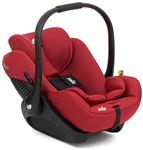
Child seats that fit a Hyundai Kona
Our unique Car Seat Chooser shows you which child car seats will fit this car and which seat positions that they will fit, so that you don't have to check every car seat manufacturer's website for compatibility.Hyundai Kona Value

Hyundai Kona 2024: Prices
The Hyundai Kona starts from a little over £25,000 in Advance grade with the 1.0-litre engine. While it's no longer a budget option (the Dacia Duster caters for that market), the Hyundai Kona is priced roughly in line with other small SUVs like the Vauxhall Mokka and the popular Ford Puma.
You can get a Skoda Kamiq or Volkswagen T-Cross for slightly less but, when you start comparing trim levels, you'll realise that you'll get more for your money with the Hyundai Kona. Even the most affordable Hyundai Kona Advance comes comprehensively equipped - standard kit includes twin 12.3-inch digital displays, a reversing camera and 17-inch alloy wheels.
You'll pay a premium of £4300 for a hybrid Kona over the basic 1.0-litre petrol, while the new Hyundai Kona Electric starts from around £35,000.
Hyundai Kona 2024: Running Costs
Electric model aside, the cheapest Hyundai Kona to run will be the hybrid. This officially returns up to 60.1mpg. Like most hybrid SUVs of this size, it's a 'self-charging' hybrid, so you won't need to plug it in for maximum efficiency.
We found the hybrid Kona to be capable of around 45mpg during day-to-day driving, which is a fair way off its official figure and quite a lot less than you'd get in a Toyota Yaris Cross. High-mileage drivers might prefer to look at competitors offered with an unfashionable diesel engine (such as the Volkswagen T-Roc).
Like all Hyundai models, the Hyundai Kona comes with a five-year, unlimited-mileage warranty, along with a year's roadside assistance. Our annual Satisfaction Index reveals that Hyundai owners are generally very happy with their cars - with the brand ranking in the top 10 overall.
Satisfaction Index
 What is your car like to live with?
What is your car like to live with?
We need your help with our latest Satisfaction Index, so that we can help others make a smarter car buying decision. What's it like to live with your car? Love it? Loath it? We want to know. Let us know about your car - it will only take a few minutes and you could be helping thousands of others.
Help us with the Honest John Satisfaction Index nowDriving Hyundai Kona

Hyundai Kona 2024: Handling and ride quality
The Hyundai Kona is pretty unexciting to drive, but that'll be fine for those of us seeking a comfortable and reassuring companion. Its relatively soft suspension setup means it'll isolate you from lumps and bumps in the road, while there isn't a huge amount of wind noise or tyre roar. The steering is fairly direct, although it's definitely not as sporty as a Ford Puma's.
If you do want a Hyundai Kona that's fun to drive, you might want to look at the N Line models. These are set up to be slightly sportier, while their lower-profile tyres aid handling (if not ride comfort).
Hyundai Kona 2024: Engines
There are three core engines offered in the Hyundai Kona: a little 1.0-litre 120PS petrol (available with a manual or automatic gearbox), a punchier 1.6-litre petrol (with 198PS and also offered with a manual or auto 'box) and a 1.6-litre hybrid.
It's the Hyundai Kona Hybrid that's expected to be the big seller, and it's the only one we've driven so far. It combines a petrol engine with an electric motor to produce a combined 141PS, meaning it'll accelerate to 62mph in 11.2 seconds.
That's pretty leisurely and it's certainly fair to say the Hyundai Kona Hybrid is as its best around town and in stop-start traffic.
Here, it'll mooch about for short periods under electric power. As soon as you're heavy with the accelerator, the 1.6-litre engine will come to life in quite a noisy fashion. Although we're yet to try it, we suspect the new Hyundai Kona Electric will be better in terms of both performance and refinement.
Hyundai Kona 2024: Safety
One thing you'll notice pretty quickly when driving the new Hyundai Kona is how much it loves a beep or bong. Start the engine with the door open? Beep. Stray over the speed limit? Bong.
As is becoming increasingly common, there are cameras and sensors watching your every move. We had to laugh when the car told us off for being distracted as we looked for a way of turning the speed limit warning off.
Unfortunately, some of the most useful safety features are only offered on the high-spec N Line S and Ultimate models. These include the 360-degree surround-view monitor (which gives you a cool 3D bird's-eye view of the car), as well as the safe exit warning (which warns you when a vehicle's approaching as you're exiting the car).
| Engine | MPG | 0-62 | CO2 |
|---|
Hyundai Kona Models and Specs
The Hyundai Kona Advance features 17-inch alloy wheels (18-inch on hybrid models), body coloured door mirrors and door handles, rear spoiler, roof rails and front and rear skid plates.
Interior features include height adjustment for both front seats, dual-zone climate control, automatic rear-view dimming mirror, automatic headlights and windscreen wipers, cruise control (smart cruise control with stop and go function on hybrid and DCT models), electric parking brake, front and rear parking sensors with rear camera and guidance system and keyless entry with start/stop button.
The Advance trim also includes two curved 12.3-inch infotainment screens with navigation, DAB radio, Apple CarPlay and Android Auto. There are also front and rear USB-C charging points.
The Hyundai Kona Ultimate adds a full width horizon centre daytime running light with full projection LED headlamps, black (or grey) leather seats, an opening sunroof and BOSE premium sound system with 7 speakers and subwoofer.
The Ultimate trim offers the full suite of safety systems as found in the Advance as well as Blind Spot Collision Avoidance Assist, Rear Cross Traffic Collision Avoidance Assist, Parking Distance Warning (side function), Parking Collision Avoidance Assist (reverse function), Safe Exit Warning and Surround View Monitor.
The sportier Hyundai Kona N Line features a dedicated front and rear bumper design, side skirts, 18-inch alloy wheels, twin exhaust tips, black gloss door mirrors, body-coloured wheel arch inserts and an optional black roof.
Interior changes include aluminium pedals, N Line cloth interior with heated front and rear seats. In addition to bespoke styling, the N Line trim also introduces additional equipment including interior ambient lighting, power tailgate, heated steering wheel and wireless charging pad for compatible devices.
The Hyundai Kona N Line S builds on this with Alcantara & leather trimmed seats that are both heated and ventilated, with electrical adjustability, three zone air conditioning and BOSE premium sound system with 7 speakers and subwoofer.
External enhancements for the N Line S feature the signature full width horizon centre daytime running light and full projection LED headlamps.
As well as styling and equipment, N Line S also offers additional safety equipment, with Blind Spot Collision Avoidance Assist, Rear Cross Traffic Collision Avoidance Assist, Parking Distance Warning (side function), Parking Collision Avoidance Assist (reverse function), Safe Exit Warning and Surround View Monitor.
| Dimensions | |
|---|---|
| Length | 4350 mm |
| Width | 2100 mm |
| Height | 1585 mm |
| Wheelbase | 2660 mm |
| Miscellaneous | |
|---|---|
| Kerb Weight | 1435–1975 kg |
| Boot Space | - |
| Warranty | |
| Servicing | - |
| Costs | |
|---|---|
| List Price | - |
| Insurance Groups | - |
| Road Tax Bands | Exempt |
| Official MPG | - |
| Euro NCAP Safety Ratings | |
|---|---|
| Adult | - |
| Child | - |
| Pedestrian | - |
| Overall | - |
Good
- 466-litre boot is usefully big.
- Even the entry-level Hyundai Kona Advance is well-equipped.
- Infotainment looks good and is easy to use.
Bad
- Hybrid model is slow and less efficient than rivals.
- Interior could have a little more character.
- Beeps and bongs get irritating very quickly.
Model History
April 2023
New Hyundai Kona priced from £25,725
Hyundai Motor UK has announced pricing and specifications for the all-new KONA range.
The second-generation KONA offers one of the most comprehensive product packages in the B-SUV segment, including the widest range of powertrains. Customers can choose from EV (standard or long range), hybrid electric (HEV) and internal combustion engine (ICE) variants as well as sporty N Line versions of each. Details of the EV range will be announced separately.
Compared to the previous generation KONA, the new model has unique proportions with increased dimensions. Based on the EV variant, its length is now 4,350 mm, 145 mm longer than the previous generation launched in 2017, with a wheelbase of 2,660 mm, which is 60 mm longer. Its width is 1,825 mm, which is 25 mm wider, and the height is 20 mm taller at 1,575 mm.
With its rugged, dynamic design and upscaled dimensions, the all-new KONA retains its iconic character, supporting active lifestyles for customers of all ages and generations, while offering new technologies and convenience features that provide a safe, connected, and comfortable experience.
slide 1 of 3
Among the upgrades are dual 12.3-inch panoramic display screens, full Over-the-Air (OTA) updates and Connected Car Navigation Cockpit (ccNC) which will also be able to support future Feature on Demand applications. Fitted as standard across the all-new KONA range is a standard navigation and infotainment system comprising of a 12.3” screen, Bluetooth, DAB radio, LIVE services, MapCare, Apple CarPlay™ and Android Auto™, steering wheel controls and front and rear USB C charging points.
All-new KONA is also available with a Digital Key, which can use a compatible device to lock, unlock and start the vehicle. Digital Key uses near-field communication (NFC), Bluetooth low energy (BLE) and ultra-wide band (UWB) protocols on smartphones or smart watches (Android and iOS), which assures a high level of security.
The all-new KONA hits the ground running with Hyundai’s SmartSense Advanced Driver Assistance System (ADAS) and safety systems. All KONA trim levels include a suite of safety systems including Downhill Brake Control, Driver Attention Warning, eCall, Forward Collision Avoidance Assist with Car, Pedestrian, Cycle and Junction Turning functions, Hill-start Assist Control, Intelligent Speed Limit Assist, Lane Keep Assist, Lane Follow Assist and Leading Vehicle Departure Alert. Optional trim levels also see the additions of Blind Spot Collision Avoidance Assist, Rear Cross Traffic Collision Avoidance Assist, Parking Distance Warning (side function), Parking Collision Avoidance Assist (reverse function), Safe Exit Warning and Surround View Monitor.
The all-new KONA range is available in 4 trim levels, with customers able to select either the Advance or Ultimate which offer a stylish and clean design mixed with a comprehensive specification, or N Line and N Line S that add a sporting design influenced by Hyundai’s N models and combine it with the similar high level of standard equipment.
The all-new KONA’s Advance trim level is priced from £25,725 for the Advance 1.0T 120PS 6 speed manual transmission. The Advance offers 17” alloy wheels (18” on hybrid models), body coloured door mirrors and door handles, rear spoiler, roof rails and front and rear skid plates. Interior features include height adjustment for both front seats, dual zone climate control, automatic rear-view dimming mirror, automatic headlights and windscreen wipers, cruise control (smart cruise control with stop and go function on hybrid and DCT models), electric parking brake, front and rear parking sensors with rear camera and guidance system and keyless entry with start/stop button. The Advance trim includes a high level of technology, with a standard navigation and infotainment system comprising of dual curved 12.3” screens, Bluetooth, DAB radio, LIVE services, MapCare, Apple CarPlay™ and Android Auto™, steering wheel controls and front and rear USB C charging points. The Advance trim is also available with a 1.0 120PS 7 speed dual clutch transmission, or a 1.6 hybrid 141PS 6 speed dual clutch transmission.
The Ultimate trim starts from £29,925 for the Ultimate 1.0T 120PS 6 speed manual transmission. The Ultimate combines the dynamic design of KONA Advance and adds further technical and luxurious features such as the full width horizon centre daytime running light with full projection LED headlamps, black leather seats with a no cost grey leather option, opening sunroof and BOSE premium sound system with 7 speakers and subwoofer. The Ultimate trim offers the full suite of safety systems as found in the Advance and in addition adds Blind Spot Collision Avoidance Assist, Rear Cross Traffic Collision Avoidance Assist, Parking Distance Warning (side function), Parking Collision Avoidance Assist (reverse function), Safe Exit Warning and Surround View Monitor. Optional powertrains for the Ultimate include the 1.0 120PS 7 speed dual clutch transmission, 1.6 turbocharged 198PS engine with 6 speed manual transmission or 7 speed dual clutch transmission and the 1.6 hybrid 141PS 6 speed dual clutch transmission. Equipment options for the Ultimate include Digital Key (compatible device required and manual transmission only), Lux Pack with Digital Key (compatible device required), Memory Driver's Seat, Premium Relaxation Front Seats (1.0T / 1.6T DCT only) and Lux Pack with Digital Key (compatible device required), Memory Driver's Seat, Premium Relaxation Front Seats and Remote Smart Park Assist (Hybrid only).
Customers looking for a more sporting aesthetic to the all-new KONA can select the N Line trim, with prices starting from £27,525 for the N Line 120PS 6 speed manual transmission. The N Line boasts several bespoke styling features compared with the Advance and Ultimate, with a dedicated front and rear bumper design, side skirts, 18” alloy wheels, twin exhaust tips, black gloss door mirrors, body coloured wheel arch inserts and an optional black roof.
Interior changes include aluminium pedals, N Line cloth interior with heated front and rear seats. In addition to bespoke styling, the N Line trim also introduces additional equipment including interior ambient lighting, power tailgate, heated steering wheel and wireless charging pad for compatible devices. The N Line can also be optioned with a 1.0 120PS 7 speed dual clutch transmission, or a 1.6 hybrid 141PS 6 speed dual clutch transmission.
Customers wishing to optimise the sporty N Line trim even further can choose the N Line S, which starts from £29,925, the N Line S 1.0T 120PS 6 speed manual transmission builds on the N Line with additional equipment including N Line Alcantara & leather trimmed seats that are both heated and ventilated, with electrical adjustability, three zone air conditioning and BOSE premium sound system with 7 speakers and subwoofer. External enhancements for the N Line S feature the signature full width horizon centre daytime running light and full projection LED headlamps. As well as styling and equipment, N Line S also offers additional safety equipment, with Blind Spot Collision Avoidance Assist, Rear Cross Traffic Collision Avoidance Assist, Parking Distance Warning (side function), Parking Collision Avoidance Assist (reverse function), Safe Exit Warning and Surround View Monitor. Options for the N Line S include the powertrain options of 1.0 120PS 7 speed dual clutch transmission, and the 1.6 turbocharged 198PS engine with 6 speed manual transmission or 7 speed dual clutch transmission and the 1.6 hybrid 141PS 6 speed dual clutch transmission. Further option packs include the Lux Pack with Electric Sunroof & Digital Key* (Manual Transmission only), Lux Pack: Electric Sunroof, Digital Key*, Memory Driver's Seat, Premium Relaxation Front Seats (1.0T / 1.6T DCT only) and Lux Pack: Electric Sunroof, Digital Key*, Memory Driver's Seat, Premium Relaxation Front Seats and Remote Smart Park Assist (Hybrid only).
Customers will also be able to select from a wide pallet of exterior colours and interior trims dependant on trim level and powertrain type:
All-new KONA not only offers customers a considerable uplift of size, style and specification over the previous generation model but will also see significant value improvements, with strong residual values throughout the range, with Ultimate, N Line and N Line S hybrids achieving best in class residual figures amongst their competitor set.
Details of the all-new KONA Electric range will be released early this summer.


